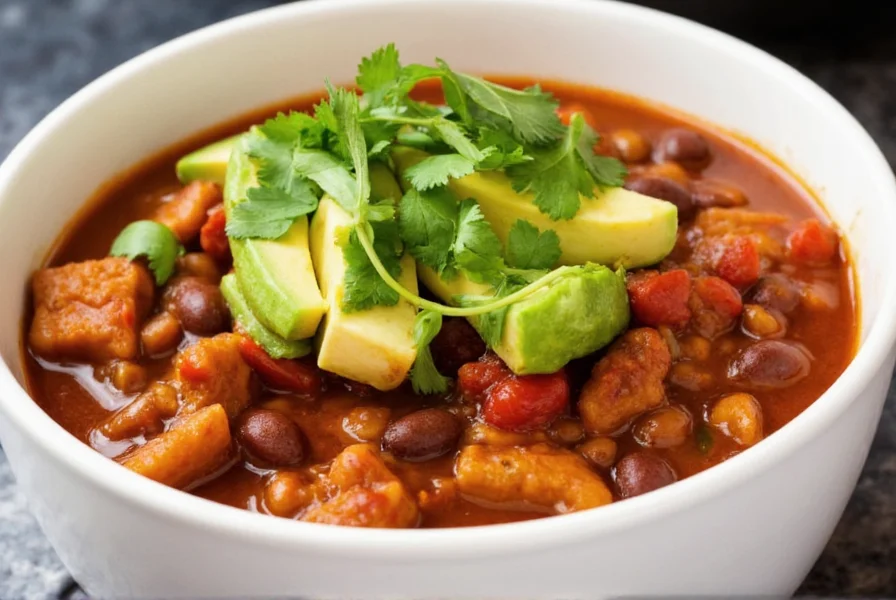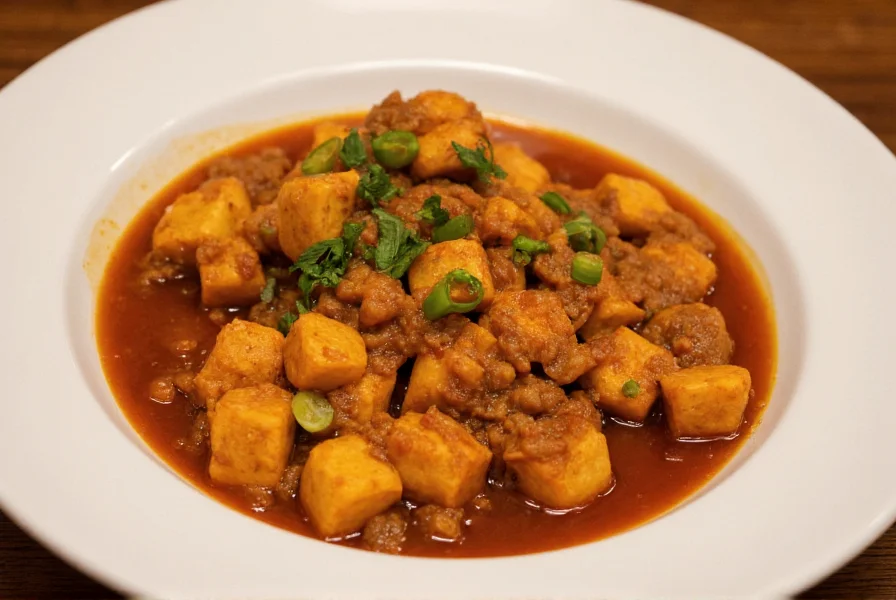Creating exceptional tofu chili requires understanding how to transform this mild-flavored ingredient into a satisfying centerpiece. Unlike ground meat that naturally absorbs spices, tofu needs special preparation to achieve that perfect chili texture and taste. This comprehensive guide reveals professional techniques for making tofu chili that even meat lovers will enjoy, with science-backed methods for maximizing flavor and nutrition.
The Science Behind Perfect Tofu Texture
Many tofu chili attempts fail because of texture issues. The secret lies in understanding tofu's composition. Tofu contains up to 90% water, which prevents proper browning and causes mushiness when added directly to chili. Professional chefs recommend these evidence-based preparation steps:
- Pressing: Remove excess water by pressing tofu for 15-30 minutes using a tofu press or weighted plate
- Freezing: Freeze then thaw tofu to create a more porous, meat-like texture that absorbs flavors better
- Marinating: Soak pressed tofu in umami-rich liquids like soy sauce, liquid smoke, or mushroom broth for at least 30 minutes
- Drying: Pat tofu completely dry before cooking to achieve proper browning
Nutritional Advantages of Tofu Chili
Tofu chili offers significant nutritional benefits compared to traditional meat versions. According to USDA nutritional data, a standard serving (1 cup) of tofu chili typically contains:
| Nutrient | Tofu Chili (per cup) | Beef Chili (per cup) |
|---|---|---|
| Calories | 220-250 | 280-320 |
| Protein | 14-16g | 18-20g |
| Total Fat | 8-10g | 14-16g |
| Saturated Fat | 1.5-2g | 5-6g |
| Fiber | 9-11g | 5-7g |
The higher fiber content comes from combining tofu with beans and vegetables, promoting better digestion and sustained energy. Tofu provides complete plant protein with all nine essential amino acids, making it an excellent protein source for plant-based diets.
Step-by-Step Tofu Chili Recipe
Follow this chef-developed method for restaurant-quality tofu chili at home. This easy tofu chili recipe for beginners yields six generous servings.
Ingredients
- 1 block (14 oz) extra-firm tofu, pressed and frozen/thawed
- 2 tbsp olive oil
- 1 large onion, diced
- 3 garlic cloves, minced
- 1 bell pepper, diced
- 28 oz crushed tomatoes
- 15 oz black beans, drained
- 15 oz kidney beans, drained
- 2 tbsp chili powder
- 1 tbsp cumin
- 1 tsp smoked paprika
- 1 tsp oregano
- 1 cup vegetable broth
- 1 tbsp soy sauce or tamari
- 1 tbsp maple syrup
- Salt and pepper to taste
Preparation Method
- Prepare tofu by pressing for 30 minutes, then crumble into small, uneven pieces
- Heat olive oil in large pot over medium-high heat
- Add crumbled tofu and cook until golden brown on all sides (8-10 minutes)
- Remove tofu and set aside
- In same pot, sauté onions, garlic, and bell pepper until softened
- Add spices and cook for 1 minute until fragrant
- Return tofu to pot with tomatoes, beans, broth, soy sauce, and maple syrup
- Simmer uncovered for 25-30 minutes, stirring occasionally
- Adjust seasoning and serve with preferred toppings

Advanced Techniques for Flavor Enhancement
For those seeking to elevate their high-protein vegan chili with tofu, consider these professional techniques:
- Layered seasoning: Add half your spices when sautéing vegetables and the rest during simmering for complex flavor development
- Acid balance: Finish with 1-2 tbsp lime juice or apple cider vinegar to brighten flavors
- Umami boosters: Incorporate 1-2 tbsp nutritional yeast or 1 tsp mushroom powder for depth
- Texture variation: Reserve some tofu pieces for adding in the last 10 minutes to maintain distinct texture
- Slow simmer: Cook on low heat for 45-60 minutes for more integrated flavors (stir occasionally)
Common Tofu Chili Mistakes to Avoid
Even experienced cooks make these errors when preparing spicy tofu chili with beans:
- Skipping the pressing step: Results in watery chili with poor texture
- Overcooking tofu: Causes it to disintegrate rather than maintain hearty chunks
- Insufficient seasoning: Tofu requires more spices than meat to achieve bold flavor
- Adding all liquid at once: Dilutes flavors; better to add broth gradually as needed
- Not allowing resting time: Chili tastes significantly better after sitting for 15-20 minutes off heat
Variations for Different Dietary Needs
Tofu chili adapts beautifully to various dietary requirements while maintaining its satisfying heartiness:
- Gluten-free: Naturally gluten-free when using tamari instead of soy sauce
- Oil-free: Sauté vegetables in vegetable broth instead of oil
- Spicier version: Add 1-2 diced jalapeños with the vegetables and 1/2 tsp cayenne pepper
- Milder version: Reduce chili powder to 1 tbsp and omit cayenne
- Protein boost: Add 1/2 cup cooked quinoa during the last 10 minutes of cooking
Storage and Reheating Guidelines
Proper storage maximizes both food safety and flavor development. Tofu chili follows these guidelines:
- Refrigeration: Store in airtight container for up to 5 days
- Freezing: Freeze for up to 3 months (thaw overnight in refrigerator)
- Reheating: Warm on stove over medium-low heat with 1-2 tbsp water to prevent drying
- Flavor development: Tofu chili often tastes better the second day as flavors continue to meld











 浙公网安备
33010002000092号
浙公网安备
33010002000092号 浙B2-20120091-4
浙B2-20120091-4